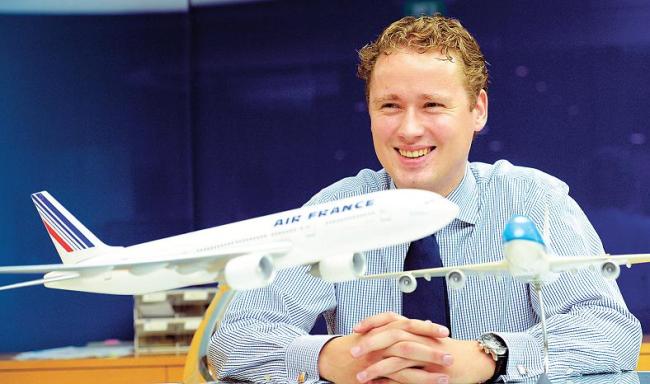Understanding local audience key to growth in Korean market, executive in Seoul says
Despite the eurozone fiscal crisis, European airliners are continuing their expansion into the Asia-Pacific region, where it is still seeing some growth.
China was the second largest airline market in the world last year, with an estimated 300 million travelers and revenues of approximately $57.6 billion, according to the International Air Transport Association.
So it makes sense that Air France-KLM is looking to grab a bigger slice of the Asia-Pacific pie, a market in which it already provides 12 percent of seats from Korea to Europe, the airline’s commercial director Simon Scholte said.
Toward these efforts, the airline’s regional office in Korea will focus on expanding its presence in the area.
This means understanding Korean customers’ wants and needs.
“Inside the Korean customer (base) you have all kinds of different profiles. You have the business traveler, you have the student, you have the missionary,” Scholte said in an interview with The Korea Herald last week.
But some general characteristics start to emerge when looking at the audience as a whole, and Korean customers differ from their European counterparts in several key ways, according to Scholte.
Despite the eurozone fiscal crisis, European airliners are continuing their expansion into the Asia-Pacific region, where it is still seeing some growth.
China was the second largest airline market in the world last year, with an estimated 300 million travelers and revenues of approximately $57.6 billion, according to the International Air Transport Association.
So it makes sense that Air France-KLM is looking to grab a bigger slice of the Asia-Pacific pie, a market in which it already provides 12 percent of seats from Korea to Europe, the airline’s commercial director Simon Scholte said.
Toward these efforts, the airline’s regional office in Korea will focus on expanding its presence in the area.
This means understanding Korean customers’ wants and needs.
“Inside the Korean customer (base) you have all kinds of different profiles. You have the business traveler, you have the student, you have the missionary,” Scholte said in an interview with The Korea Herald last week.
But some general characteristics start to emerge when looking at the audience as a whole, and Korean customers differ from their European counterparts in several key ways, according to Scholte.

“Korean travelers like to travel in groups and they are quite focused on Korean products and services,” he said. According to the airline executive, European travelers are less likely to travel in groups and are less bound by national products, including carriers.
Travel agencies in Korea also play a greater role in ticket sales than they do in Europe, where tickets are frequently sold on the Internet, Scholte said.
To appeal to the customer base here, the company has been offering Korean products on inbound and outbound flights to and from its hub in Incheon.
KLM flights currently have Korean news and meals on board, and passengers can find Korean movies, newspapers and meals on flights operated by Air France.
Air France-KLM has also tapped into the social media business in Korea.
“It’s a good way to improve product awareness and a way to engage with our friends and customers,” Scholte said.
Currently, KLM has a Korean-language Facebook page and a blog on Korean Internet portal Naver, while Air France offers a webzine.
And the company used this customer interaction when devising its latest in-flight menu, he said.
For example, it recently polled its fans on its Facebook page. Out of four options ― bibimbap, bulgogi, kimchi fried rice and spicy chicken ― kimchi fried rice was the most popular, so this dish is now being offered on inbound and outbound KLM flights from Seoul.
When Air France and KLM first entered the Korean market in 1983 and 1984, respectively, a mutual goal shared by both airlines was offering more travel destinations for Korean customers, says Scholte.
“So not just direct flights (from Korea) to Paris or Amsterdam, but the whole range of services,” the 31-year-old Dutchman said.
These services have expanded even more since then, especially after the two European carriers merged in 2004.
Currently, Air France-KLM offers flights to over 200 destinations in more than 120 countries, and ranks among the best in terms of the number of destinations offered, according to company officials.
But while passenger demand remains relatively strong as more and more people travel by air, European carriers such as Air France-KLM face an uphill battle for the second half of this year, according to industry sources.
IATA said Monday that the global airline business will make just $3 billion in profits this year, while European carriers are expected to round up with a loss of $1.1 billion.
Scholte, who has been working for the airline since 2006 and a Seoul resident for a little over a year, said he likes the airline business due to its interconnectedness.
“Everything that happens in the world has an impact on the airline industry. You have the oil prices, you have conflict in the country that can impact operations, (as well as) environmental issues and economic (factors),” he said.
By Renee Park (renee@heraldcorp.com)
-
Articles by Korea Herald







![[Graphic News] More Koreans say they plan long-distance trips this year](http://res.heraldm.com/phpwas/restmb_idxmake.php?idx=644&simg=/content/image/2024/04/17/20240417050828_0.gif&u=)
![[KH Explains] Hyundai's full hybrid edge to pay off amid slow transition to pure EVs](http://res.heraldm.com/phpwas/restmb_idxmake.php?idx=644&simg=/content/image/2024/04/18/20240418050645_0.jpg&u=20240419100350)






![[From the Scene] Monks, Buddhists hail return of remains of Buddhas](http://res.heraldm.com/phpwas/restmb_idxmake.php?idx=652&simg=/content/image/2024/04/19/20240419050617_0.jpg&u=20240419175937)

![[KH Explains] Hyundai's full hybrid edge to pay off amid slow transition to pure EVs](http://res.heraldm.com/phpwas/restmb_idxmake.php?idx=652&simg=/content/image/2024/04/18/20240418050645_0.jpg&u=20240419100350)

![[Today’s K-pop] Illit drops debut single remix](http://res.heraldm.com/phpwas/restmb_idxmake.php?idx=642&simg=/content/image/2024/04/19/20240419050612_0.jpg&u=)